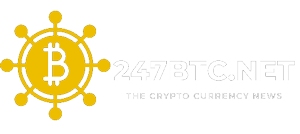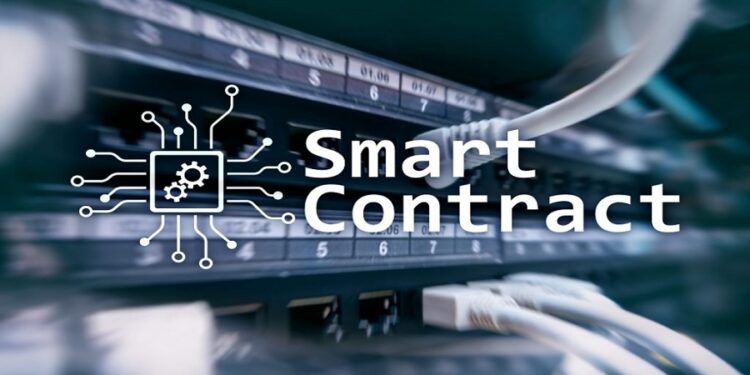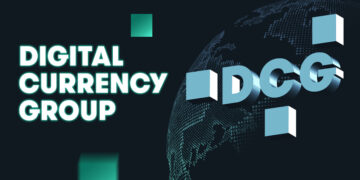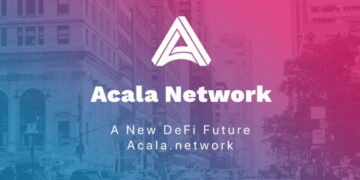Table of Contents
ToggleBlockchain Currency and Blockchain Smart Contract

As of the current time, Smart Contracts can be regarded as the most widely utilized application of blockchain technology.
In 1994, Nick Szabo, a legal scholar and cryptographic expert, introduced the concept of smart contracts. He argued that any decentralized ledger could be utilized as self-executable contracts, which later became known as smart contracts. These digital contracts can be converted into machine code and executed on a blockchain.Despite the idea of smart contracts having been in existence for a considerable amount of time, the current world we live in still heavily relies on paper-based contracts. Even with the use of digital contracts, the involvement of third-party intermediaries may lead to security issues or fraudulent activities, as well as an increase in transaction costs. However, the current issues can now be resolved with the emergence of blockchain technology, enabling all entities in the network to interact with each other in a decentralized manner, thereby eliminating the involvement of third-party intermediaries. To put it simply, blockchain is a technology that allows us to store data on a distributed ledger. Record and transaction data are updated in real-time for all parties in the network, guaranteeing transparency and data integrity. Thanks to its functionality, smart contracts have the ability to be utilized in various industries and sectors such as smart homes, e-commerce, real estate and asset management, among others.
What are smart contracts?
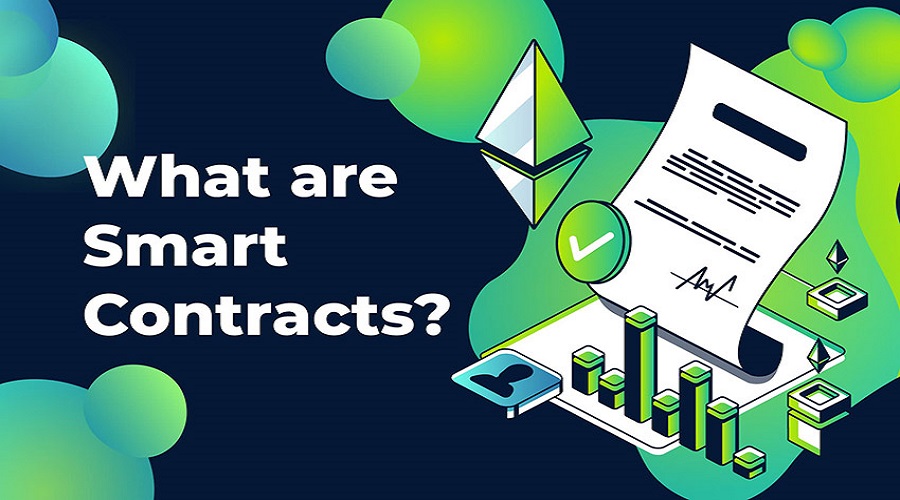
A smart contract is a computer code that comprises a set of agreement rules between two or more parties, built on a blockchain system. It is established through a multitude of regulations that satisfy the participants’ requirements.This code enables the automation of decentralized processes by creating, verifying and enforcing the terms of a basic agreement. In other words, a Smart Contract is a code that can be automatically executed and stored on a blockchain containing predetermined rules. When these rules are met, the code will execute automatically and provide an output. At its simplest form, a Smart Contract is a program that runs in a format established by its creator. Smart contracts enable the exchange of any valuable asset such as currencies, stocks, and properties transparently, without the need for intermediaries and with a reduced risk of system conflicts. These contracts are commonly used in business collaboration to agree on predetermined terms by both parties’ consent, minimizing fraud risks and reducing costs since there is no involvement from a third party.
How do Blockchain smart contract work?

In situations such as these, implementing a smart contract proves to be an ideal solution for mitigating potential risks and reducing associated costs.
The smart contract is designed to operate based on conditional code (if, this, then, that). And it automatically executing transactions only when the required amount and accompanying rules are met. Transaction funds and ownership rights will be stored on a decentralized system witnessed and validated by all participants in the network, leaving no room for fraud. Furthermore, there is no need for third-party intermediaries. As all functions previously performed by real estate agents can now be encoded in the smart contract. Resulting in cost savings for both buyers and sellers.The benefits of implementing Blockchain smart contract is numerous and significant
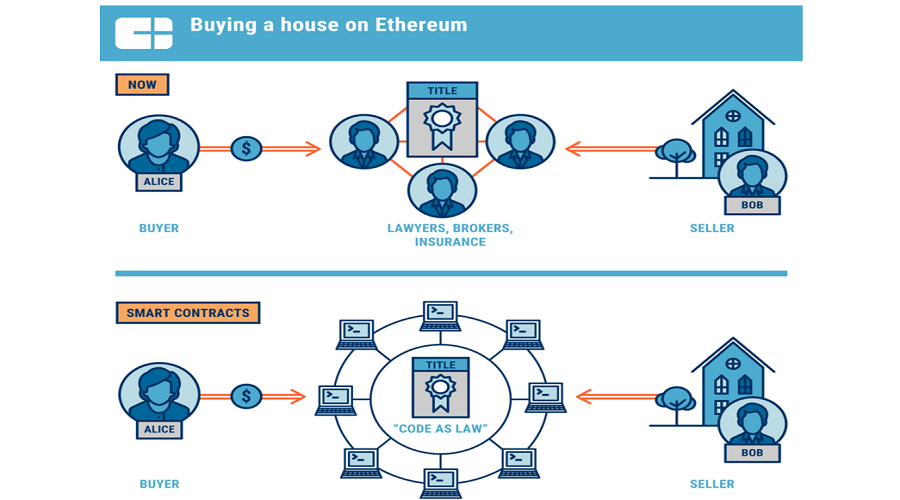
Transparency
One of the fundamental characteristics of blockchain that smart contracts also inherit is transparency. As previously mentioned, a smart contract contains various clauses, rules, and detailed conditions that are verified by the parties involved in the agreement. This characteristic of a smart contract enables the involved parties to ensure transparency during the transaction process. As the terms and conditions are carefully examined and only included when agreed upon by all participants. By doing so, it helps eliminate the possibility of disputes and issues in the later stages.Save time
Any process related to traditional document handling usually takes several days to complete. Due to the involvement of numerous intermediaries and unnecessary procedures. In contrast, smart contracts run on the internet as software code, eliminating the need for manual processing by humans or intermediaries. As a result, significant time savings can be achieved. The implementation of smart contracts can result in significant time savings, even several days, compared to any traditional business process.Accuracy
It is imperative to thoroughly understand and hold all the terms and conditions of a smart contract before its activation. Any terms outside the contract may result in errors during execution. Therefore, in creating a smart contract, all conditions must be detailed and precise in the form. The presence of such capability makes the smart contract a comprehensive agreement whereby it can execute all necessary tasks automatically. In the case of a manual contract, there is a possibility of errors occurring because the person responsible for carrying out the contract may overlook a specific term or condition. Furthermore, there is no way to monitor it until an error arises. Therefore, the smart contract provides a better alternative, ensuring almost absolute accuracy when executed.Safe and effective
The presence of such capability makes the smart contract a comprehensive agreement whereby it can execute all necessary tasks automatically. In the case of a manual contract, there is a possibility of errors occurring because the person responsible for carrying out the contract may overlook a specific term or condition. Furthermore, there is no way to monitor it until an error arises. Therefore, the smart contract provides a better alternative, ensuring almost absolute accuracy when executed. Furthermore, due to their high accuracy and security, smart contracts enhance their efficiency level and provide greater value for transactions.Data saving
The intelligent contract ensures an accurate and precise agreement down to the smallest detail. All aspects of any transaction are stored and accessible by involved parties at any given time. This feature proves to be extremely helpful in resolving any future disputes related to the contract terms.Cost savings
Replacing traditional agreements with smart contracts can provide significant cost savings. Smart contracts only involve the parties to the agreement, eliminating the need for intermediaries. Individuals such as lawyers, witnesses, and intermediaries do not hold any role in using smart contracts. Additionally, as previously stated, smart contracts are a more cost-effective alternative to paper-based documents due to their ability to bypass lengthy and complicated procedures.Reliability
The transparency and security features of smart contracts instill reliability in the eyes of businesses, as they eliminate the slightest possibility of manipulation or human error. Once the predetermined conditions are met, the smart contract will execute automatically.Some applications of Blockchain smart contract in finance
Smart Contracts In Insurance Industry
The absence of automation in insurance administration is a notable concern. As it results in lengthy claim processing times that can span anywhere from weeks to months. This subsequently presents challenges for both customers and insurance companies alike. Customers are burdened by restricted timeframes while waiting for their money, while insurance companies must deal with issues such as superfluous administrative expenses, unfulfilled clientele, and a notable lack of efficacy.
Blockchain smart contract in Supply Chain
Effective supply chain management encompasses the seamless movement of goods and products from their inception to their ultimate destination, and is integral to the success of myriad industries. Given its complexity, the successful orchestration of a supply chain relies on the participation of multiple parties. Incorporating smart contracts into the supply chain process offers the added benefit of secure record-keeping of ownership rights throughout the products’ transit. Additionally, all members of the supply chain network can easily track the location of the product at any given time.
Mortgage Loans
The complexity of mortgage agreements arises from the extensive inclusion of details such as the mortgagee’s income, credit score, and outgoings. It is crucial to conduct thorough checks on these details prior to proceeding with mortgage loans. However, this process is often facilitated by intermediaries and third parties which may result in a prolonged and burdensome experience for both the lender and loan applicant. Utilizing smart contracts in this particular scenario offers various advantages, primarily the eradication of intermediaries to prevent time-consuming procedures and uncertainty. In addition, all pertinent information can be consolidated in a singular location that is easily retrievable by both involved parties throughout the entire transaction process.Employment Contracts
Smart contracts are essential in ensuring compliance with the terms of employment agreements. Failure by either the employer or the employee to meet their obligations can compromise the integrity of the agreement, leading to mistrust. To avoid this, a single smart contract can be utilized to establish clear terms and conditions of the employment, including salary amounts, job responsibilities, and other relevant records. Such transactions can be recorded and referenced in case of any disputes, thereby enhancing the employee-employer relationship and promoting fairness. Additionally, smart contracts offer a convenient solution for simplifying the wage payment process, ensuring the agreed-upon amount is delivered to the appropriate employee within a designated time frame. Furthermore, when temporary labor is involved and an intermediary agency is responsible for coordinating the employment, smart contracts can be leveraged to establish transparency and prevent interference with the employee’s contractual terms once they are hired by the company. By utilizing smart contracts, any amendments to contractual agreements can easily be identified and resolved, facilitating a more efficient and trustworthy employment process.Limitations of Blockchain smart contract
Smart contracts offer distinct advantages such as cost reduction, increased transparency, and time savings. While reliable, secure, efficient, and more trustworthy than paper contracts, businesses must recognize the unavoidable risks when adapting to digital processes. When programming smart contracts, humans are the ones responsible and mistakes can be made. As a result, to avoid potential risks, users must seek out highly skilled programmers for their team when setting up smart contracts. Poorly designed smart contracts can result in significant losses, as demonstrated by the multi-million dollar vulnerabilities in Ethereum’s smart contracts. Therefore, it is crucial to have expertise in place when creating these contracts to ensure their effectiveness. The cost of deployment is a concern for many users, given the significant expenses associated with infrastructure, computers, and skilled programmers. However, users only need to invest in deployment costs and do not have to incur additional expenses for intermediary transactions. This has made many users and investors willing to pay for the implementation costs of smart contracts.Conclude
The potential applications of smart contracts are extensive and not limited. These contracts can be employed for various daily agreements as well as large-scale contracts for governments and enterprises in the future. Despite being a work in progress, the continuous development of technology will undoubtedly become an integral component of the world’s financial system, wherein blockchain and smart contracts will be an indispensable part.What is Animoca Brands? Investment trends of Animoca Brands fund
The investment fund, Animoca Brands, specializes in the areas of NFT, gaming, and metaverse. An analysis has been conducted on...
Read moreWhat is Stader Labs (SD)? A comprehensive guide to SD cryptocurrency
What is Stader Labs? Stader Labs is a multichain Liquid Staking platform that enables users to participate in staking while...
Read moreWhat is DeFi Land (DFL)? A comprehensive overview of the digital currency DFL
DeFi Land is a simulated farming game developed to gamify the DeFi ecosystem on Solana, however, the current state of...
Read moreWhat is OpenSea? A comprehensive guide on how to use the NFT Marketplace OpenSea with detailed instructions
OpenSea is a state-of-the-art tool that caters to the new demand of humans in today's era, which involves the buying...
Read moreWhat is Friend.tech? Overview of the electronic currency Friend.tech
The Base is a layer constructed by the Coinbase team that has been mainnet for a considerable amount of time...
Read moreWhat is Highstreet? Complete information about HIGH & STREET Token
The ongoing explosive growth of Metaverse is anticipated to continue through the end of 2021, and it is predicted to...
Read moreWhat is Ancient8 (A8)? Complete information about A8 cryptocurrency
The robust growth of Axie Infinity and the GameFi model in general in 2021 remains a topic of utmost importance...
Read moreWhat is Yield Guild Games (YGG)? This comprehensive article elucidates the intricacies of the YGG cryptocurrency
The recent surge of the Trend Play to Earn phenomenon has provided a launching pad for numerous game development projects...
Read moreWhat is BlackRock, and what are the implications of the financial giant’s foray into the world of cryptocurrencies?
On August 11th, BlackRock issued a statement announcing its intention to offer Bitcoin spot investment services to its clients through...
Read moreWhat is Digital Currency Group (DCG) and what are the investment trends of the DCG fund?
The Digital Currency Group is a prominent investment fund established in 2015 that has made successful investments in numerous projects...
Read moreWhat is Lido DAO? A comprehensive overview of the LDO Token cryptocurrency
Numerous projects utilize Staking as a solution for reducing supply and voting proposal. However, as a consequence, staked assets are...
Read moreWhat is Octopus Network (OCT) ? A comprehensive overview of the OCT cryptocurrency
The NEAR Protocol currently hosts an immensely significant project for its ecosystem, which regrettably has yet to garner the attention...
Read moreWhat is Acala Network (ACA)? Overview of the cryptocurrency ACA coin
Acala Network has recently gained significant attention from the community. The project's success in winning the first Parachain on Polkadot...
Read moreWhat is Yield Farming? Gain a comprehensive understanding of the terminology associated with Yield Farming
The concept of Yield Farming, prominent Yield Farming platforms, and the associated risks and opportunities are explored in this article,...
Read moreWhat is Ripple ( XRP coin )? An general introduction to the Ripple coin
Bitcoin is the largest digital currency in the world, with a limit of 21 million units, and it is well-known...
Read more